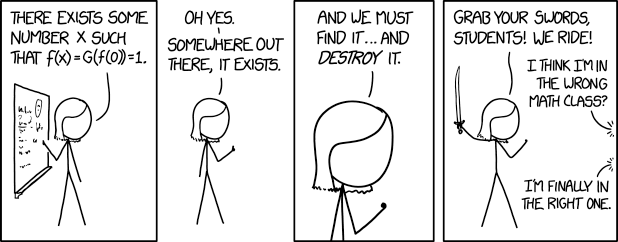CMSC250
Proofs

Proofs
Proofs
Recall the valid argument
\(\begin{array}{rl} & p \Rightarrow \sim z \\ & z \land (p \lor r) \\ & \sim q \\ \therefore & p \Rightarrow q \end{array}\)
Recall the valid argument
\(\begin{array}{rll} (1) & p \Rightarrow \sim z &\\ (2) & z \land (p \lor r) &\\ (3) & \sim q &\\ (4) & z & \text{ Specialization (2)}\\ (5) & {\sim} p & \text{ Modus Tollens (1,4)}\\ (6) & {\sim} p \lor q & \text{ Generalization (5)}\\ \therefore & p \Rightarrow q & \text{Definition of Implication} \end{array}\)
Three things:
- Intro (Preamble)
- Body
- Conclusion
Three things:
- Intro (Preamble) Things typically found here:
- Type of Proof
- Assumptions
- What it is you Want To Prove (WTP)
- Body
- Conclusion
Three things:
- Intro (Preamble)
- Body Things typically found here:
- Use of Laws, Rules, operations to conclude more information
- Steps to obtain the WTP (must logically follow)
- Conclusion
Three things:
- Intro (Preamble)
- Body
- Conclusion Things typically found here:
- QED, \(\blacksquare\)
- Explaination of your Conclusion
Direct Proofs
Direct Proof: You assume what you have to be true, and then use a series of logical steps to find new facts until you reach your goal
Prove: \((\forall x\in \mathbb{Z})[\text{ if } x \text{ is even, then } 3x+7 \text{ is odd}]\)
Prove: \((\forall x\in \mathbb{R})[\text{ if } x > 5 \text{ then } x^2 -x - 10 > 10]\)
Prove: \(\text{ if } a\vert b \text{ and } b\vert c \text{ then } a\vert c\)
Disprove: All even integers can only be written as a sum of two primes no more than one way.
Recall: Disproving \(\forall\) usually means proving \({\sim}\forall\)
Disprove: If \(ac \equiv bc\) (mod \(m\)) then \(a \equiv b\) (mod \(m\))
Direct Proof by Exhaustion (of a universal statement)
We show all possible cases are true
Note: must be finite possibilities
Prove: \((\forall x \in \{1,2,4,6\})[x^2 + 1\) is prime]
Contraposition
Sometimes proving \(p \Rightarrow q\) is hard
Sometimes proving \(p \Rightarrow q\) is hard
Prove: \((\forall a,b \in \mathbb{Z})\)[if \(a \nmid (2b)\), then \(a \nmid b\)]
Sometimes proving \(p \Rightarrow q\) is hard
Recall: \(p \Rightarrow q \equiv {\sim}q \Rightarrow {\sim}p\)
Proof via contrapositive: Instead of proving \(p \Rightarrow q\), directly prove \({\sim}q \Rightarrow {\sim}p\)
Prove: \((\forall a,b \in \mathbb{Z}]\)[if \(a \nmid (2b)\), then \(a \nmid b\)]
Prove: If the square of an integer is even, then that integer is even
Contradiction
Sometimes statements are not implications
Sometimes proving a statement is true is hard
Sometimes statements are not implications
Sometimes proving a statement is true is hard
Prove: There is no greatest integer
Proof via Contradiction: Assume the negation, and then find any contradiction
Note: This is when two facts disagree, or a definition breaks
Prove: \([\forall x \in \mathbb{R})[x \neq x + 1]\)
Prove: There is no greatest integer
Prove: \((\forall x \in \mathbb{Z})\)[if \(x\) is even, then \(x\) is not odd]
Recall \(\sim (p \Rightarrow q) \equiv (p \land {\sim} q)\)
Prove: \((\forall x \in \mathbb{Z}\))[if \(x \equiv 3\) (mod \(6\)), then \(x \not \equiv 2\) (mod \(3\))]